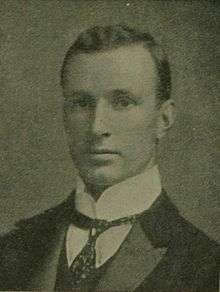Sir John Barran, 2nd Baronet

Sir John Nicholson Barran, 2nd Baronet (16 August 1872 – 8 July 1952) was a British Liberal Party politician.
Background
Barran was the son of John Barran (1844–1886) and the grandson of Sir John Barran, 1st Baronet. His mother was Eliza Henrietta, daughter of Edward Nicholson. He was educated at Winchester and Trinity College, Cambridge.[1] He married firstly Alice Margarita, daughter of Reverend Leighton Parks, in 1902. They had three sons and one daughter. His youngest son Sir David Barran became a prominent businessman and served as Managing Director and Chairman of Shell. After his first wife's death in 1939 he married secondly Esther Frances, daughter of Francis Marion Bates Fisher, in 1946. Barran died in July 1952, aged 79, and was succeeded in the baronetcy by his eldest son John.
Political career
Barran was elected to the House of Commons at a by-election in March 1909 as the Member of Parliament (MP) for Hawick Burghs.
| Party | Candidate | Votes | % | ± | |
|---|---|---|---|---|---|
| Liberal | Sir John Barran | 3,028 | 54.7 | ||
| Liberal Unionist | Halford John Mackinder | 2,508 | 45.3 | ||
| Majority | 520 | 9.4 | |||
| Turnout | 92.8 | ||||
| Liberal hold | Swing | ||||
He was re-elected with a large majority in January 1910
| Party | Candidate | Votes | % | ± | |
|---|---|---|---|---|---|
| Liberal | Sir John Barran | 3,261 | 59.0 | +4.3 | |
| Liberal Unionist | James Edward Graham | 2,268 | 41.0 | -4.3 | |
| Majority | 993 | 18.0 | +8.6 | ||
| Turnout | 91.7 | -1.1 | |||
| Liberal hold | Swing | +4.3 | |||
He was returned unopposed in December 1910.[3] He served as Parliamentary Private Secretary to Prime Minister H. H. Asquith from 1910 to 1916. After the war he tried unsuccessfully to return to parliament, standing as Liberal candidate for Hull North West at the general elections of 1922, 1923 and 1924.[4]
| Party | Candidate | Votes | % | ± | |
|---|---|---|---|---|---|
| Unionist | Albert Lambert Ward | 14,904 | 57.1 | ||
| Liberal | Sir John Barran | 11,204 | 42.9 | ||
| Majority | 3,700 | 14.2 | |||
| Turnout | |||||
| Unionist hold | Swing | ||||
| Party | Candidate | Votes | % | ± | |
|---|---|---|---|---|---|
| Unionist | Albert Lambert Ward | 12,674 | 50.2 | ||
| Liberal | Sir John Barran | 12,559 | 49.8 | ||
| Majority | 115 | 0.4 | |||
| Turnout | 73.7 | ||||
| Unionist hold | Swing | ||||
| Party | Candidate | Votes | % | ± | |
|---|---|---|---|---|---|
| Unionist | Albert Lambert Ward | 15,072 | 53.3 | ||
| Liberal | Sir John Barran | 8,080 | 28.5 | ||
| Labour | Ferdinand Louis Kerran | 5,151 | 18.2 | ||
| Majority | 6,992 | 24.8 | |||
| Turnout | 81.2 | ||||
| Unionist hold | Swing | ||||
Apart from his political career he was a Justice of the Peace for the West Riding of Yorkshire.
References
- ↑ "Barran, John Nicholson (BRN891JN)". A Cambridge Alumni Database. University of Cambridge.
- ↑ The Times, 6 March 1909
- ↑ British parliamentary election results 1885-1918, Craig, F. W. S.
- ↑ British Parliamentary Election Results 1918-1949, F W S Craig
- ↑ British Parliamentary Election Results 1918-1949, F W S Craig
- ↑ British Parliamentary Election Results 1918-1949, F W S Craig
- ↑ British Parliamentary Election Results 1918-1949, F W S Craig
External links
- Hansard 1803–2005: contributions in Parliament by Sir John Barran
| Parliament of the United Kingdom | ||
|---|---|---|
| Preceded by Thomas Shaw |
Member of Parliament for Hawick Burghs 1909–1918 |
Constituency abolished |
| Baronetage of the United Kingdom | ||
| Preceded by John Barran |
Baronet (of Chapel Allerton Hall and Queen's Gate) 1905–1952 |
Succeeded by John Leighton Barran |